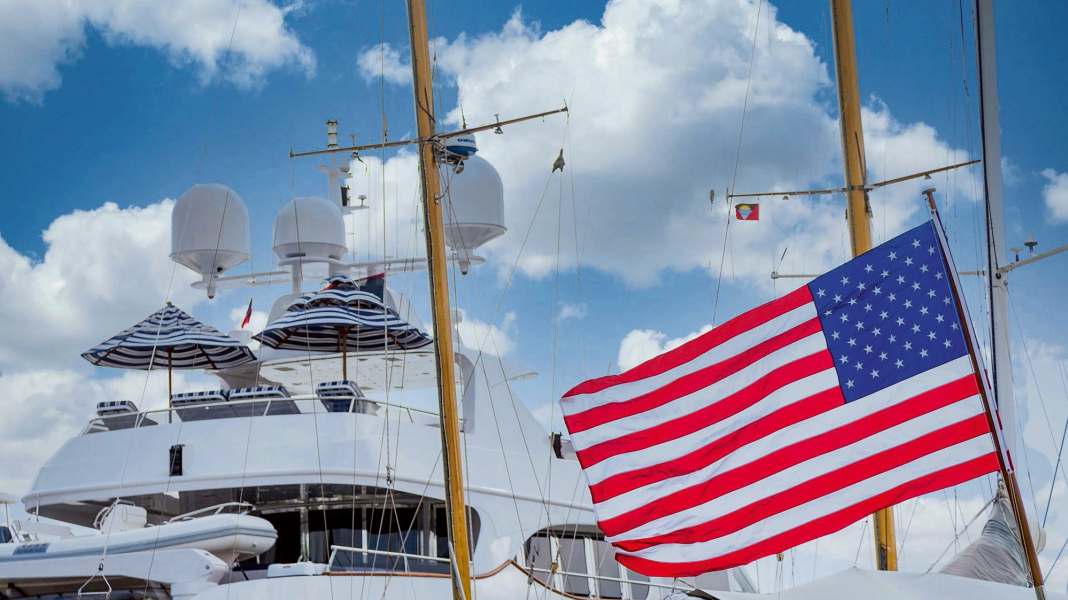Yachting law: To what extent does the political situation affect us in yachting?
Boote Exclusiv
· 05.03.2025

- Trade sanctions against China?
- Possible consequences for the end customer
- To what extent would a military conflict between China and Taiwan have an impact?
- Greenland as the 51st US state?
- American law in Greenland?
- The EU Green Deal - what's next?
- Further effects on us in the Yachting
- Experts for all questions of yacht law
A glance at the headlines of the last few weeks shows the range of current issues. To summarise, they go something like this: "Yachting is now going 'green'! - America is considering buying Greenland. - Yachts with Chinese technology on board are becoming unaffordable." Let's take a look at the contents one by one.
Trade sanctions against China?
As we remember, President Trump has already caused quite a stir in international trade relations during his first term in office. In January 2025, even before his inauguration, the US imposed extended trade sanctions against China. There has also been a trade dispute between the European Union (EU) and China for some time, which recently led to additional tariffs being imposed on certain Chinese products. Is there really a threat of comprehensive regulations against China in the style of the Russia sanctions? What would it mean for the yachting industry if the USA or the EU were to impose comprehensive trade sanctions against China?
Trade sanctions are an instrument of international politics. They are an attempt to influence the political will of another country. Economic pressure is used to persuade the target countries to take certain actions or change their behaviour. One of the main measures in the context of trade sanctions are import duties and export and import bans. Certain individuals or groups can also be targeted. This restricts trade and makes economic development more difficult. At first glance, it can be assumed that prices for yachts from Chinese shipyards would rise. This effect would probably be negligible.
Possible consequences for the end customer
On closer inspection, however, it becomes clear that the influence on the European yacht market could go much further. Many of the aluminium and electronic components used in yachts come from China. Specialised electronics for navigation systems, communication devices, engines and drives are manufactured in China and installed in "European" yachts. Import duties or even sanctions on these components would result in massive price increases for the end customer.
Yachts manufactured in Europe could also become considerably more expensive. Yacht components produced in China must first be imported to Europe. This transport to the EU must also be taken into account with regard to possible trade sanctions. Supply chains could be interrupted or at least impaired. The consequences are known: Delays in production and therefore delays in the delivery of yachts, additional costs again and an overall shift in supply and demand with unpredictable effects on prices and availability. Shipyards and suppliers would be forced to source the necessary materials and components from other manufacturers and from other countries. The relocation of production in the context of such a serious market shift could also lead to higher production costs and have unforeseen price consequences.
To what extent would a military conflict between China and Taiwan have an impact?
Embedded in a military conflict between China and Taiwan, the consequences for the European yacht industry would be even more noticeable. In such a case, the EU would certainly seriously consider taking action against China. Whether it would even be economically feasible to impose sanctions on the scale that are currently in force against Russia remains an exciting question. The consequences would be far-reaching. Export and import bans, resulting in supply bottlenecks and exploding costs. Manufacturers, service providers and customers would have to pay very close attention to ensure that no sanctions offences are committed. Even yacht owners would have to carry out comprehensive due diligence checks when chartering or buying a yacht. These would range from the question of the validity of the contracts and the obligation to pay through to the criminal consequences of a sanctions offence.
Greenland as the 51st US state?
The incumbent President of the United States of America, Donald Trump, announced before his inauguration that he wanted to incorporate Greenland into the USA. The reasons for this are probably of a strategic nature. Donald Trump's plan provoked numerous reactions. In fact, Donald Trump is not the first American president to pursue this plan. Under President Truman, secret talks (purchase negotiations?) were even held between Denmark and the USA. Reason enough to consider what it would mean if this idea could be realised. Would this have consequences for the yacht sector, and if so, what would they be?
Greenland is indeed an increasingly popular holiday destination. Hardly any other region has such a variety of expedition yachts (for charter trips) and adventure routes. Greenland is currently a legally independent region within the Danish system of government. Far-reaching legal changes would occur if Greenland were to become part of the USA. For the coastal areas of Greenland, for example, this would mean that American regulations could apply. One example of this is the Jones Act, which applies to coastal traffic within the USA. The Jones Act gives ships sailing under the US flag privileges and requires a certain proportion of US crew on board the ships in order to move between American ports without a licence. This could then also apply to yachts and passenger ships within Greenland. Larger charter ships and expedition vessels that do not meet these requirements would have to obtain extra licences.
Read also:
American law in Greenland?
A significant change for the yachting sector could also be the applicable law and the place of jurisdiction in the event that Greenland is incorporated into the USA. Greenland has had its own government and parliament since 1979. Greenland has created its own laws in many areas. If Greenland were to become part of the USA, this situation could change and - insofar as the USA does not recognise Greenlandic regulations - American law could apply.
An interesting aspect for insurers. Passengers would have direct access to American justice and American law and the notoriously far-reaching claims for personal injury would become a tangible reality. The swell in the Arctic Ocean certainly also influences the frequency of accidents.
The EU Green Deal - what's next?
The EU Emissions Trading Scheme (EU ETS) in this column. Emissions trading is intended to promote the EU's goal of climate neutrality. The starting point is a simple basic idea: the emission of CO2 is priced - certificates must be purchased for this purpose, which can then be traded.
The permitted (certifiable) CO2 emissions are set in annually decreasing upper limits, which steadily reduces the permitted amount of CO2. The EU ETS was extended to shipping in 2024. It currently applies to ships with a gross tonnage of 5,000 gross tonnes or more, which means that the scope of application for yachts is (still) narrow. But the room for manoeuvre is narrowing. Authoritative circles report that Brussels is already considering extending the EU ETS to smaller ships, especially yachts of 500 gross tonnes or more. This would directly affect the yacht sector in terms of both utilisation and construction.
Further effects on us in the Yachting
In view of the EU's climate targets, this expansion does not seem far-fetched anyway. It is even conceivable that even more far-reaching adjustments will be made in future and that smaller ships and yachts will also be included in the emission reduction targets. The consequence would be that owners of such ships would also have to purchase certificates for their CO2 emissions. The prices of these certificates fluctuate constantly and, in view of the fact that the EU wants to phase out the free distribution of emission certificates by 2034, prices will tend to rise rather than fall. Added to this would be the additional work involved in monitoring emissions with increased operating costs, which could also be reflected in higher charter prices. Another effect of extending the EU ETS to smaller ships and yachts could be the increased demand for climate-friendly technologies, which would promote their expansion in the future.
The increased costs for yachts that are not "climate-friendly" could play a decisive role in a purchase decision and lead to a trend towards e-yachts. The majority of all-electric yachts are manufactured in Germany, the Netherlands, Slovenia and Poland. As you can see from the above discussions, many things are currently in motion. In any case, you are now mentally prepared.
Experts for all questions of yacht law

The yacht lawyers Dr Tim Schommer (tim.schommer@clydeco.com) and Dr Volker Lücke (volker.luecke@clydeco.com) have been advising yacht clients in Germany and abroad for over 18 years. They advise on the planning and construction phase, the purchase and sale, the owner structure, yacht operation including insurance, crewing and charter as well as the handling of damage and third-party claims.

